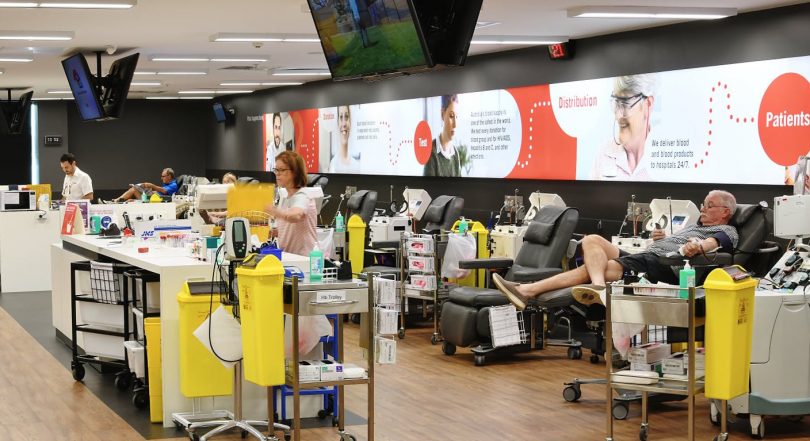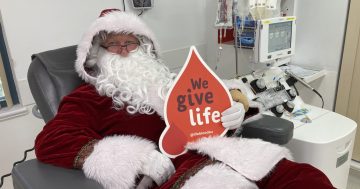
The Australian Red Cross Lifeblood service is set to collect blood from recovered COVID-19 patients to help research into treatment of the virus. Photo: Australian Red Cross Lifeblood Facebook.
The plasma from people who have recovered from COVID-19 will soon be used as part of a potential solution to fight the virus.
The Australian Red Cross Lifeblood service will begin collecting convalescent plasma donations from patients who have recovered from COVID-19. This may help boost the immunity of people still battling the disease, particularly those whose illness is progressing towards the need for ventilation.
Convalescent plasma is the liquid part of blood that contains antibodies. Once someone has recovered from COVID-19, the virus’ antibodies stay in their plasma.
A product will be developed from recovered donors whose plasma has a high level of antibodies – proteins that fight a virus. These antibodies will be pooled, purified and concentrated to make COVID-19 immunoglobulin, also known as a hyperimmune globulin.
The first convalescent plasma donations will begin flowing from 11 May, following a trial conducted by CSL Behring Australia, a leading biopharmaceutical company that manufactures remedies for rare and serious conditions.
As part of a partnership between the Federal Government and Australian Red Cross Lifeblood, in response to the COVID-19 pandemic, the convalescent plasma will be used to treat patients in clinical trials, both as a form of direct treatment and as COVID-19 immunoglobulin medication, which may provide passive immunity against coronavirus infections.
Potential donors must have had a confirmed laboratory diagnosis of COVID-19, and must have fully recovered from the virus and be symptom-free for at least 28 days.
“We’re incredibly proud to be part of this initiative, but we need help from people who have been diagnosed with, and have recovered from, COVID-19,” said Australian Red Cross Lifeblood chief executive Shelly Park.
“We have been in discussions with governments and CSL Behring Australia about how we could quickly assist in any clinical trials of this treatment in Australia, and will begin collecting plasma from recovered donors from Monday.”
Ms Park said Australian Red Cross Lifeblood will be engaging people in local hospitals and health departments to recruit donors as well as looking to existing donors who may be able to identify suitable participants.
“The development of COVID-19 immunoglobulin may ultimately help treat patients suffering from this terrible disease and I would urge anyone who has recovered from a confirmed case of COVID-19, who thinks they may be eligible to donate blood, to contact us,” said Ms Park.
“It’s important to note that safety is Lifeblood’s number one priority and there is no risk to donors or staff from this initiative. Our convalescent plasma donors will have to satisfy the same strict eligibility criteria as our other donors and the process of collecting convalescent plasma is the same as the existing plasma donation process.”
It is estimated up to 800 plasma donations will be required to produce sufficient COVID-19 immunoglobulin to treat 50-100 seriously ill people in the clinical trial.
CSL Behring’s chief medical officer, Dr Charmaine Gittleson, said convalescent plasma is already being trialled as a treatment for patients suffering from COVID-19 in a number of countries including China, Canada, the US and UK.
“Our efforts will leverage the full spectrum of our onshore capabilities, from research and development through to advanced manufacturing to provide Australian clinicians with an additional treatment option in the fight against COVID-19,” said Ms Gittleson.
If the clinical trial is successful and subject to a request by the Australian Government, CSL Behring will seek to register COVID-19 immunoglobulin with the Therapeutic Goods Administration to allow its ongoing supply in Australia.
CSL Behring’s immediate research involves two phases. The first is the production of a small batch of COVID-19 immunoglobulin that will be used to develop tests to detect the presence of antibodies. The second phase will involve a larger batch of COVID-19 immunoglobulin that will be used in clinical trials in Australia’s hospitals to establish the safety of the product.
The product will be developed at CSL Behring’s manufacturing facility at Broadmeadows in Victoria.
Regular blood and plasma donations are still required at Australian Red Cross Lifeblood centres, however most spots are booked one to two weeks in advance.
“Donating plasma is a simple, powerful act that could help a patient struggling to fight the disease,” said Ms Park. “It is a real opportunity for people who have battled COVID-19 to become part of a potential solution.”
If you have recovered from a confirmed diagnosis of COVID-19 and believe you may be eligible to donate plasma, call 13 14 95 and mention that you want to donate convalescent plasma, or visit the Australian Red Cross Lifeblood website.













